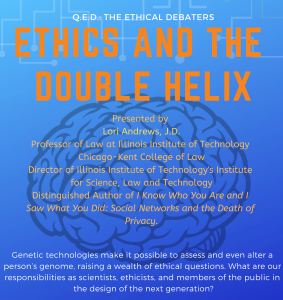 Genetic technologies make it possible to assess and even alter a person’s genome, raising a wealth of ethical questions. Should insurers be able to deny coverage to a healthy person whose genome indicates he or she will be at a higher risk of cancer later in life? Should police be able to use ancestry DNA databases to find suspected criminals? Should parents be able to edit their embryo’s genome, possibly added traits from other species, such as to give their future child the running speed of a cheetah? What are our responsibilities as scientists, ethicists, and members of the public in the design of the next generation?
Genetic technologies make it possible to assess and even alter a person’s genome, raising a wealth of ethical questions. Should insurers be able to deny coverage to a healthy person whose genome indicates he or she will be at a higher risk of cancer later in life? Should police be able to use ancestry DNA databases to find suspected criminals? Should parents be able to edit their embryo’s genome, possibly added traits from other species, such as to give their future child the running speed of a cheetah? What are our responsibilities as scientists, ethicists, and members of the public in the design of the next generation?
Please join QED: The Ethical Debaters for a talk by University Distinguished Professor of Law Lori Andrews on Monday, April 1 from 12:45–1:45 p.m. in Wishnick Hall, Room 113. Lunch will be provided.
Lori Andrews is a University Distinguished Professor of Law at Chicago-Kent College of Law and director of Illinois Tech’s Institute for Science, Law, and Technology. She’s written 14 books including three mysteries involving a female geneticist. Her latest non-fiction book is “I Know Who You Are and I Saw What You Did: Social Networks and the Death of Privacy.” She chaired the federal advisory committee to the Human Genome Project, advised the Chicago Historical Society on the ethics of testing Abe Lincoln’s DNA, and counseled the science ministers of 12 countries on the issues of embryo stem cells, gene patents, and DNA banking. Andrews’s path-breaking litigation about technologies caused the National Law Journal to list her as one of the “100 Most Influential Lawyers in America.” The American Bar Association Journal describes Andrews as “a lawyer with a literary bent who has the scientific chops to rival any CSI investigator.” She received her B.A. summa cum laude from Yale College and her J.D. from Yale Law School.
